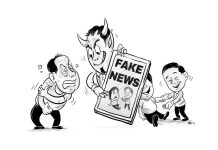
WHEN we think of classrooms, they often evoke memories of laughter, friendships, and intellectual discovery. But there’s another, darker facet emerging in education that challenges the traditional roles of students and teachers alike: gaslighting. Though frequently associated with romantic relationships, gaslighting — a form of manipulation that makes someone doubt their reality—has infiltrated classrooms, disrupting school culture and placing educators in a psychological tug-of-war with their students.
In Filipino classrooms, gaslighting can take various forms, often subtle yet unsettling. A teacher may reprimand a student for using a mobile phone during class, only to have the student deny it vehemently, supported by peers who insist, “Wala naman, Ma’am, si Juan talaga ’di nagp-hone.” Similarly, a teacher might notice several students whispering and exchanging notes, but when confronted, the students collectively claim they were discussing assignments. These incidents may seem trivial, but they can make teachers question their perception and doubt their authority. Over time, especially for teachers new to the profession or working in a contractual capacity, this behavior can create a lingering sense of insecurity, gradually eroding confidence and control in the classroom.
What makes gaslighting in classrooms unique is its inherent inversion of power. Traditionally, teachers hold authority, but students who band together can quickly reshape this dynamic, using collective denial to manipulate classroom interactions. It’s not just about challenging the teacher’s authority; it’s a direct attempt to distort their reality. This psychological tension chips away at the integrity of the learning environment and subtly erodes the trust essential to effective teaching and learning.
The concept of truth is central to education, yet gaslighting attempts to bend this truth, leaving teachers struggling to maintain credibility and authority. In environments where teachers feel consistently challenged by manipulative behavior, the risk of burnout intensifies. A recent study in the Journal of Educational Psychology underscores this point, finding that teachers facing regular challenges to their authority reported significantly higher stress levels and a diminished sense of professional fulfillment. This trend suggests that the impact of gaslighting goes beyond individual classrooms, threatening the broader school culture by undermining trust between students and educators.
Gaslighting also exposes a flaw in conventional classroom management. Traditional techniques, such as setting clear rules or enforcing consequences, may not be sufficient when dealing with calculated manipulation. Teachers confronted with gaslighting behaviors need strategies that go beyond routine discipline. For instance, documenting incidents, maintaining composure, and enlisting support from colleagues can be crucial, especially in settings where students see manipulation as a viable tool to shift accountability. When faced with manipulative tactics, teachers can reinforce an environment of openness by consistently addressing such behavior calmly and without anger, highlighting the value of honesty and transparency. (To be continued)/PN







